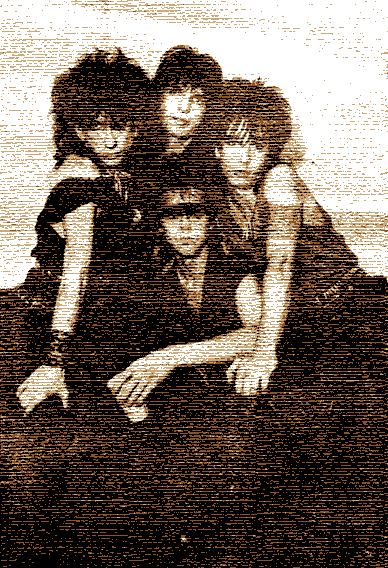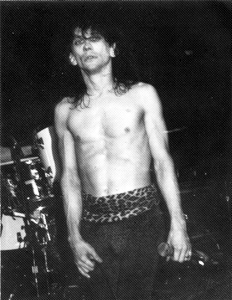
|
Search JoyZine with Google Site Search! |
The Lords of the New Church interview by Joy Williams
The Lords of the New Church is an English/American Gothic rock supergroup with a line-up consisting of four musicians from 1970s punk bands.
Frontman Stiv Bators, once the leader of seminal New York punkers the Dead Boys, was a man who has long gone in for stage violence—hanging himself on stage, slashing himself with broken bottles—he claims to have broken more bones than anyone in the business. Not that shock value was everything. The Dead Boys were very influential early punkers. And Lord's guitarist, Brian James, was a founding member of the early English punk scene as a member of The Damned, the first English punk band to come over to America, in '77. So, there was good reason to talk to these people, I figured. they are true punks—not riche punks, not suburban punks or weekend punks or pretend-for-the-audience punks, but the genuine article. OK. Soundcheck is over and I enter the dressing room. They're eating vegetarian lasagna and drinking 7-Up. A fan sends in a box of chocolates. They give me food and drink and even save some of the chocolates 'specially for me. They're nice, they're polite, they're not upset at my conservative grey silk shirt (in stark contrast to the generally ghoulish attire of the rest of the audience). "It doesn't matter what you look like," Stiv reassures me. "It's your attitude that's important. So many people are in uniforms—put on a leather jacket and be a punk!" he sneers. So how do you know who's punk, if it's not in their clothes? "It's an attitude, really," Brian offers. "It's just a rock'n'roll attitude, that's all." Stiv agrees. And Dave adds, "We're a rock'n'roll band, not a punk band." "You see, it's the rebellious rock'n'roll attitude that's punk," Stiv explains. "It's the same attitude that the Stones had, and The Who had. The Stooges, too. It's the same music, the leather jackets, revolution and all that. It's just the way we live, really. It's a continuation of the old gypsy thing—traveling, expressing our pain through music." "And pleasure," Brian continues, "One thing about our gigs is that it's a celebration. The kids come down and have a good time; it's a celebration of youth." "The celebration of church. It is a religion," Stiv nods his head seriously. "You, too, can be a lord of the new church, the punk church. But you have to live it, you have to believe." "It's a 24-hour-a-day thing," Brian throws in. What it boils down to is that punk is a belief system. It's how you relate to the world, it's the way you think and feel and live and dream. You push everything to the edge, security is unimportant—indeed,it's a trap, like money and success.
"You need money, of course," admits Stiv. "Every band needs to be successful to reach more people. That's the whole idea of it. [But] it depends on how you use your money. You can either worry about keeping it and invest it, or you can use it to better your art. People like Keith Richards handle it very well—he's not out buying apartment buildings, he just uses his money for freedom." Punk, Stiv maintains, was a response to the failure of earlier movements. "That whole optimistic viewpoint they fought for for so long... they tried to change the world, but they didn't. [People] got fed up with all that bullshit, and that's why we had the punk movement." So you feel that you really have to believe it, 24 hours a day?" I wonder. "You don't have to," observes Brian, "I mean, it's not a conscious thing. You're either a punk or you're not. It's not even so much a matter of faith as a matter of being." Stiv tosses in my favorite quote of the evening: "We're so nihilistic that we're optimistic." Does that mean you need to continue to ignore rules, to live your way, regardless of the consequences? Yes, "so long as you do it without hurting anyone else." But why is it so difficult for so many people, this living by their own rules? Stiv opines, "Because they condition you not to think, all through your life—television, programming, commercials. When I moved to London, I started thinking for a change. The atmosphere [there] isn't a 24-hour-a-day conditioning of your mind." The move to London radicalized Stiv. "It gave me a chance to be outside of it [the conditioning], to look back in." How do you get to that point where you believe in yourself and who you are, how do you overcome all that conditioning? "By refusing," Stiv asserts. Brian elaborates, "What we try to do is advise people to look around at all different angles of the same idea, what they believe in, and then form their own ideas and [project] their own personalities through it." After all, unless you are to become one of the controllers, all you can really do is present your audience with alternatives. "Make them aware, make people think," Dave sums up their goal. And they do it through shock. "You have to shock the audience, though, it's true," believes Stiv. "How else are you to get past the comfortable familiarity of ideas that have been fed into each of us all our lives?" The Lords of the New Church shock their audience with their songs and with their performance. They try to make everybody think, to push "all the audience" past the point of no return. |

